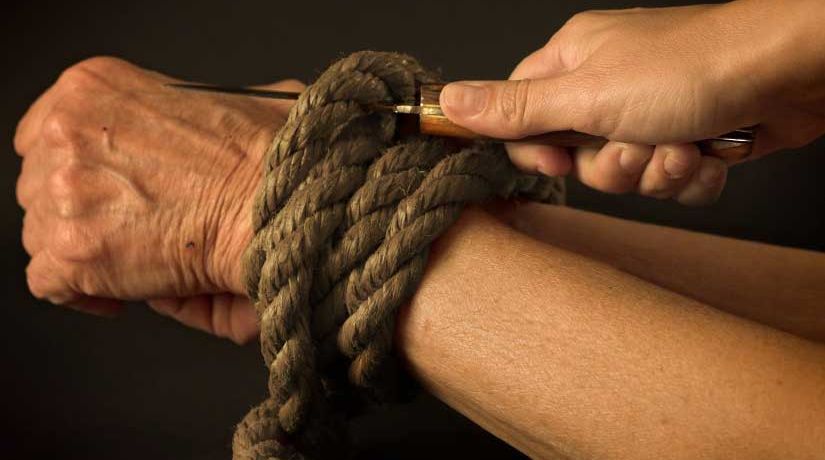The list of the “seven deadly sins” is fairly familiar: wrath, greed, sloth, pride, lust, envy and gluttony. Are these or other sins truly deadly? What does the Bible say about deadly sins?

Are there deadly sins? How do we get free from them?
The list of seven deadly sins is believed to have originated with a fourth-century monk, who composed a list of eight evil thoughts. A few changes were made to the list over time, until Pope Gregory I issued the list of seven deadly sins as we know them today. These sins were believed to cause other sins and were thus considered to be “deadly.”
The list of seven deadly sins then became popularized by the Italian poet Dante in The Divine Comedy.
What does the Bible say about deadly sins?
The specific listing of the “seven deadly sins” shown above cannot be found in any scriptural text. The Bible does show that those activities are sinful, but also reveals that other sins should be avoided as well.
For instance, in Proverbs 6:16-19, there is a list of seven things God hates. These are:
- A proud look.
- A lying tongue.
- Hands that shed innocent blood.
- A heart that devises wicked plans.
- Feet that are swift in running to evil.
- A false witness.
- One who sows discord among brethren.
Although these things are specifically called out as things that God hates, only pride matches up as one of the “seven deadly sins.”
Galatians 5:19-21 lists many “works of the flesh” and says that those who practice such things will not inherit the Kingdom of God. These works include things such as adultery, idolatry, sorcery, hatred, heresies and murder; but only one of the items listed (envy) is included in the “seven deadly sins.”
God provides a definition of sin: “Whoever commits sin also commits lawlessness, and sin is lawlessness” (1 John 3:4). The King James Version renders this as “transgression of the law.” Actions contrary to God’s law are sin. “Therefore, to him who knows to do good and does not do it, to him it is sin” (James 4:17).
Sin has a certain “life cycle” that results in death. “But each one is tempted when he is drawn away by his own desires and enticed. Then, when desire has conceived, it gives birth to sin; and sin, when it is full-grown, brings forth death” (James 1:14-15).
The list of sins resulting in death is not limited to seven! All sin leads to death, and that death would be permanent for each of us if it were not for the sacrifice of Jesus Christ, who atoned for our sins.
The list of sins resulting in death is not limited to seven! All sin leads to death, and that death would be permanent for each of us if it were not for the sacrifice of Jesus Christ, who atoned for our sins.
“For the wages of sin is death, but the gift of God is eternal life in Christ Jesus our Lord” (Romans 6:23). How did Christ’s sacrifice make forgiveness of our sins possible? And can we simply continue to sin because Jesus Christ paid the price?
Because of deadly sins, we need Christ’s sacrifice
The “wages of sin”—what sin earns for us—is death. This generally does not come in the form of God instantly striking people dead for sinning; but without Christ’s sacrifice, “eternal life in Christ Jesus” would not be possible.
The apostle Peter explains more about the sacrifice of Christ: “Who, when He was reviled, did not revile in return; when He suffered, He did not threaten, but committed Himself to Him who judges righteously; who Himself bore our sins in His own body on the tree, that we, having died to sins, might live for righteousness—by whose stripes you were healed” (1 Peter 2:23-24).
The penalty of permanent death (the wages of sin) was paid by Christ Himself at His death. The book of Hebrews illuminates further:
“For such a High Priest was fitting for us, who is holy, harmless, undefiled, separate from sinners, and has become higher than the heavens; who does not need daily, as those high priests, to offer up sacrifices, first for His own sins and then for the people’s, for this He did once for all when He offered up Himself” (Hebrews 7:26-27).
Under the sacrificial system of ancient Israel, the priest, as described in Hebrews, offered up sacrifices for himself, then offered daily sacrifices to atone for the sins of the people. Christ offered up Himself once, for all mankind, to atone for our sins.
What does God want us to do about deadly sins?
Sins are deadly—all of them. There is no scriptural indication to support the idea that there are only seven deadly sins, with the rest being of lesser severity. Sins are the transgression of God’s law and would inevitably result in permanent death if not for the sacrifice of Christ.
So where does that leave us now? Do we simply acknowledge Christ as our Savior and go on with life as before, feeling secure in the knowledge that what we do doesn’t matter from now on? The apostle Paul answers that question very directly:
“What shall we say then? Shall we continue in sin that grace may abound? Certainly not! How shall we who died to sin live any longer in it?” (Romans 6:1-2). Paul continues in verse 4: “Therefore we were buried with Him through baptism into death, that just as Christ was raised from the dead by the glory of the Father, even so we also should walk in newness of life.” Repentance and baptism are required. (For further information, please see the “Repentance” and “Baptism” sections of this website.)
After baptism, we are expected to walk in “newness of life.” We are expected to turn from sin and go in the other direction. That can be a difficult thing. Sin has a certain repetitive pattern, or cycle, as described earlier in James 1:14-15.
Breaking the cycle of deadly sins
How can we break the cycle of sin and choose a different path? Once again, our primary help is from Jesus Christ. He is our High Priest, as shown in Hebrews 7. He is also our spiritual forerunner—the One who went before us and showed us the path to follow.
“Therefore we also, since we are surrounded by so great a cloud of witnesses, let us lay aside every weight, and the sin which so easily ensnares us, and let us run with endurance the race that is set before us, looking unto Jesus, the author and finisher of our faith, who for the joy that was set before Him endured the cross, despising the shame, and has sat down at the right hand of the throne of God” (Hebrews 12:1-2).
It will also help to look at the individual steps involved in the process that leads to sin. If we are more aware and informed on how we are led into sin, step by step, then we will be better prepared to break the deadly cycle and choose a different path. Those steps are:
We are commanded by God to put sin away from our lives; and with God’s help, we can overcome sin. It is important to know how to avoid sin in the first place, so we encourage you to read these four articles for further information about each of these four steps in how to avoid sin.





